Wednesday, November 29, 2006
History Lesson
Monday, November 20, 2006
Joe Mathlete's Dog and Titty
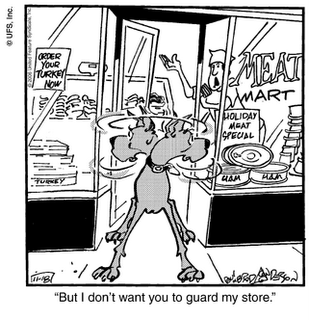 For example...Joe's explanation of this Marmaduke is as follows:
For example...Joe's explanation of this Marmaduke is as follows:Marmaduke, whose perceptions regarding Meat Mart's importance to the community are skewed at best, is defending the store against potential thieves despite protests from an employee.
Nothing wrong with that but mind you I for one don't believe that Marmaduke is concerned about the community one heck. I'd explain it so:
The gullible butcher, betrayed by positivism once again, confuses Marmaduke's territorialism as guardianship; just as slightly less than half the people of this country view our leader's actions as being in their best interests.
As for drawing a nipple on Ziggy's nose, which I am all for, why not broaden the range a bit? The world is blessed with a wide variety of papilla and accompanying aerola. While Ziggy, an existential stand-in for Jesus, is never changing doth his nipple need share his fate?
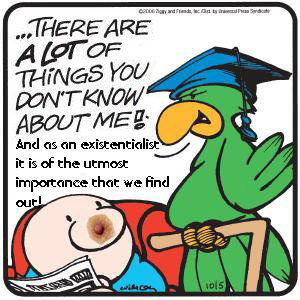
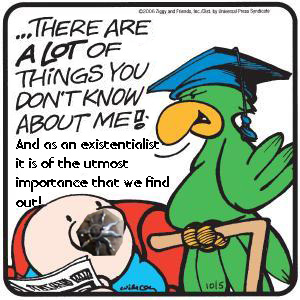
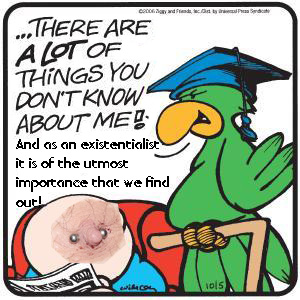
New Track du Jour
Artist: Brillo
Track: Whole Heart
Location: Sunken Monastery (Chicago,IL)
Date: 11-20-2006
Comment: Three years ago, two good friends had a baby born with Down Syndrome. It was very sad at first for everybody and scary because the boy was born with a hole in his heart. I was in a depression at the time myself and I usually sit down to write a song when I'm down. I had some familiarity with Down Syndrome though because Tricia's uncle -who is very sweet- also has DS. This is what I wrote and it's sappy ass has never seen the light of day until now. Lyrics follow:
I love your mom and dad
Two kind friends I have
and I want to meet you soon with my whole heart
tender in the things they do
I'm sure they love you too
and you'll want to love them back with your whole heart
your whole heart
I was saddened by the news
strangely not for you
it was for my own heart
still inside
you have the things that others need
kind words from family
and folks around who want the best start for you
I can give you this lullaby
you can have that part of me
you were denied
a hole must not run through it
to be empty inside
just remember this and it's alright
it's alright
Sadly enough, and this needs to be remedied soon, I have never met him.
Wednesday, November 15, 2006
Sunday, November 12, 2006
(Part IV) A Conversation with a Houston Institute: Mark Lacy
I'm planning to join you this Summer at camp if you have a counselor vacancy. I wish you'd do something like that in the winter. It would be great to get to the Southwest in February or March.
Well Mark, we've touched on a lot of stuff but it's just the tip of the iceberg. Houston folks should get involved with your organization. How can they contribute?
That's a very important question. Not just for Houston Institute for Culture, but for all people and organizations that are trying to implement proactive solutions for the future. I think we need visionary people who see past the ongoing crises and truly intend to change the world to become involved. There isn't any shortage of ability, but there is a shortage of people who think they can make a difference or even see the relationship of problems around them to their own lives.
I understand the activist experience, chasing after one injustice after another, but I think it is important to approach the multitude of issues more proactively. It's a great design of people who make self-serving policies to always have others reacting to the problems they create, rather than working toward better futures.
I always describe the organization as one that is more concerned with the ability of the forest to grow rather than the many views about what the trees should look like or how they should be managed. Those are issues for people who have the luxury of having a forest. So we are a grass roots organization in several senses, in that we know it is critical to work on the limited sources of many problems, and we won't fall victim to the notion that social innovation is limited to business and community leaders recognizing the necessary role of businesses in providing greater support to communities due to the imbalances they have created, but that people in communities should be more conscious of which businesses they support and more empowered to make important changes to the world just by the impact they have in their locality. And we are highly idealistic in thinking about what truly is the middle rather than the divided sides of policies and the tremendous imbalances of wealth and equality.
On a more practical level, we need people who can help with fundraising because we do want to offer great service projects to help children develop their ideas, like Camp Dos Cabezas and Camp Chaco, and digital storytelling classes in schools and native communities, and some redevelopment projects in the near future for young minds in the border colonias and in New Orleans.
Strangely, we need more of what successful businesses have: committed, talented people who don't quit until they accomplish what they set out to accomplish. But we need them to understand that the rewards are different. And they don't have to be in Houston; they can be anywhere in the world.
More to come, more fotos more q's for Mark Lacy.
Thursday, November 09, 2006
(Part III) A Conversation with a Houston Institute: Mark Lacy
I moved to Houston in the mid eighties for college and the first thing I liked about it was the freeways and glass buildings, and the warehouses and the underground clubs, once I found them. I came from a small town in Oklahoma with little to do and I felt like everyone I knew was very narrow minded. In Houston I lived in the suburbs, but soon moved inside the loop, where I lived with different bands and hippies, activists, drag queens, and finally the UH dorms, where I met the weirdest people of all. I also met a lot of international people.
I liked being part of a music scene that could think critically, however collectively or individually. But, in addition to hardcore and alternative music scene that followed it, I liked the zydeco, Tejano and polka bands. I always went to the International Festival and the Urban Animals? joust. I couldn?t believe all this was in one place. I was always interested to visit friends who moved away to New York and San Francisco, and soon I'll be your houseguest in Chicago. The reason I stayed in Houston, though, is because I like to travel so much. It is the hub of an interesting region, with very distinctive places in all directions, but it is a really great place to travel from, even escape from at times. I can get to all the places in the southwest that I like by making a scenic one or two day drive. I can fly to New York City or Mexico City at a pretty reasonable price. I can take a bus right out of downtown and end up in San Miguel.
From the organization perspective, there is real opportunity for research projects and need for service projects five hours in any direction. All those places, New Orleans, Fredericksburg, Galveston, Natchitoches, the Rio Grande Valley, San Antonio, even Austin, are much more distinctive than Houston, but they have and have had great influence on H-town, and vice versa.
I can see how the five lane freeways and the Big Sky reflecting off those glass buildings would be attractive to you, especially coming from a small Oklahoma town. I wasn't quite as thrilled when we moved to Houston but I was coming from the Middle East and before that from a section of Queens, New York that is considered to be the most diverse neighborhood in the world. I thought Houston was hickish - but after the first flash flood I was hooked. Canoeing in the streets is something I hadn't seen any place else. It's a big city too, you've got access to just about everything you need.
Mark, you started out in Houston, as a photographer, shooting at the clubs. You hung around with the punks and new wavers. You were close with Adam Sherburne, hanging out with Until December before they moved to San Fran. I recall you once hauled Flea of Red Hot Chili Peppers from Houston to Florida in the back of a pick up truck. What was it about that scene that hooked you? And why did you move on?
I specifically left the new wave types behind in Enid, Oklahoma. Some of them were very conflicted about their desire to be different, yet accepted, especially in their small town political views that came from lack of exposure to the world. I saw the hickishness you describe too, when I moved to Houston. I had lived in Dallas with a sort of sophisticated hickishness, but Houston and the industrial east side had real working class hicks. I wanted to know why. It looked to me like high profits and greater mechanization were leaving many out of work and then the Klan would show up and convince poor working class whites that black people were taking their jobs. It happened that way to the Vietnamese refugees who settled in coastal Texas communities and Mexican Americans as they became more integrated into the mass workforce.
I actually started out as a photographer for the John Brown Anti-Klan Committee and then started photographing in punk clubs when I figured out where to go and met the promoters. Of course there weren't really supposed to be promoters of anarchy, but there were also factory-printed anarchy t-shirts on people in the audiences, and other influences to threaten the DIY spirit of independent music. I was able to see through the nonsense and rhetoric, and support the bands and messages that I believed in. Bands like X called for examination of the divergent rich and poor. I caught the end of the heyday of party bands like the Big Boys, but I'm glad I saw them. And then there were bands like Black Flag that were sort of interested in the psychology of humans, but what they gave you on stage was an explosion of energyand contentiousness that really suited teenagers in transition, on their way to do things in life that they don't really want to do. There was some real blatant short-sightedness and stupidity too. I usually called my photo series Texas Hardcore: The Dis-Integration of
Music, because that is what I felt the bands and fans were doing in those days, resisting the narrowing of popular channels for communication.
Actually, I didn't know Adam Sherburne well in that Until December phase. I don't think he knew himself well then either. They went off the San Francisco for a record contract and became a dance club phenomenon. I knew him when his Houston band was The Usuals and you could find them most any night in a Houston pub putting on some of the greatest shows Houston has ever seen. Their songs were very eye-opening for me, even though I understood pretty complex things for a teenager. The Until December period was lost on me, but I know it
had to do with the challenges everyone faces to work and survive in much less ideal conditions than what you believe in. When he became a founder of Consolidated and dealt with important issues in an innovative way, I knew it was more in line with what he was about. Adam Sherburne was much more street-wise than me when I first showed up in Houston and he was a big influence on my ability to survive here and really get something out of it as a member of that indefinable class of idealistic youth.
There weren't so many demands and expectations in music then. Those things just weren't available, but more people could be involved. It was a time when you could be the one to drive David Hinds down the street to get something to eat, or the promoter called you up because JFA was broken down fifteen miles outside of Houston.
I think the Red Hot Chili Peppers may have been the last of that kind of experience for me. Punk was much more diverse in terms of sound than people realize, but everyone involved was ready for a change. Funk played by grungy white kids in Texas was really taking off. As a touring act, the Red Hot Chili Peppers in the first three or four albums were not to be missed. I saw them all over the country. But I had a particular experience talking with Anthony Keidis about the death of Hillel Slovak after a show at Janus Landing in St Petersburg, Florida that really made me feel like, in addition to the terrible tragedy, that music fans and musicians were on different paths.
I never really left my interest in music behind. For a period of time I traveled more than I went to see live shows, but I was lucky to live at the De Schmog house where we had music most every weekday night, and your club dates, and street parties. I started working full time about that time. There's nothing like that to ruin your fun. I've stayed close to the New Orleans music scene and in Texas I see all the zydeco bands I can. I'm a big fan of all-a-y'all up there in Chicago, but it seems like you come here on holidays when I go to Mexico. And I will travel a few states away to see Corey Harris or Galactic, because I am pretty effectively a southerner. The last real stupid thing I did was drive from Copper Canyon to New Orleans to see Quintron play on New Year's Eve. I know now better than I did years ago to support all kinds of international artists and I attend festivals from Shiner, Texas to Queens, New York. There is definitely more to do than I can possibly find time for.
Musicians are often way ahead of their fan base aren't they? Perhaps it has to do with the influence of travel and new ideas that the artist experiences. On the other hand, particularly with older musicians travel doesn't lead so much to new experiences as to an insular monotony - a suburban existence on wheels. Don't you think? (Editor's Note: Don't I sound like a complete doofus here?)
In 1994, immediately following my graduation from UoH, you and I embarked on a trip to Copper Canyon in Chihuahua, Mexico with a small group of friends. We planned a two day trip crossing the canyon from one small village to another. We had only topographical maps to guide us. We got lost and the two day trip turned into five. Our water ran out and our water purification system broke. By the end of the trip we weren't eating because we didn't want to get thirsty. We sucked on grapefruit that we plucked from trees and the acid made us sick. At one point when I was investigating a possible trail (which turned out to be a goat path) I ended up sliding down the side of a cliff and I really felt like I could have died there. We were ready to turn back (though we weren't too sure we knew how to do even that) when we met a lone hunter with a sickle who convinced us, even though we could only understand half of his Spanish, that we were close and the way was bajo bajo muy facile. We ended up in a near empty village on Christmas Day. One small family was left at the village while the rest of the folk went to a slightly larger village to celebrate. Luckily the woman had a key to the town store and we each sucked down like five Fantas. Troy Black was wearing duct tape because his shoes worn down to nothing. The woman made us Christmas dinner. That experience is one of the few things in my life that can be weighed against the thrill of playing a show. SO I empathize with your passion for nature travel. The study of nature is a big part of your life. How does that fit in with your passion for culture?
I guess I had graduated from college just a few years earlier, so I already knew not to follow goat trails.
I can't say I really study nature, other than with my camera. I always look at nature as places where people live. One of the most interesting things I've ever heard was by a Native American at a conference on the anniversary of the Lewis and Clark expedition, who raised a point that there are no words in native languages for "wilderness." It is a European perspective that something not developed for whatever purposes is wilderness. And I read a book that intrigued me called The American Replacement of Nature by William Irwin Thompson. So I've even considered nature from a social and political perspective. I guess because inevitably humans deal with it, and then they change it or they abuse it. You might think the dust bowl is what happened to people, but really, people are what happened to the Great Plains and the dust bowl is what they got. And they got it for their policies. So now we get the effects of global warming for our policies.
I'm sure that musicians develop great ideas from broad experiences of traveling, but I don't know what makes them carry on with enthusiasm, or take long breaks from music. I think I approached photography with the intensity that most musicians approach their creative work, but lately I haven't been as inspired to photograph. I just returned from San Francisco, Oakland, Berkley and Yosemite National Park. I carried
a camera with me everywhere, even up to the back side of Half Dome, but I never once got it out. That's not to say that anything has become more trivial to me. In fact, I am more deeply involved. One thing I've been doing is looking at what others look at. And I think I'm in danger of getting hooked on the very simple way of looking at things that is common of people who sit on porches in the mountains and people who practice eastern religions.
I really like taking our camp kids to the Chiricahua Mountains. They see things in nature and understand things that I miss. They use their imaginations to give personas to the rocks, or even act out their impressions of the trees. And they always see our problems as being about distance, not about our differences. When one child saw how close Juarez is to El Paso she informed us, that is where immigrants should cross.
This Lacy photo is entitled Pocahontas. More to come!
Wednesday, November 08, 2006
(Part II) A Conversation with a Houston Institute: Mark Lacy
Texasculture.org, which is called Texas Community Advocate, is part of an initiative for localism. I was thinking about the issues of local business, arts, and media pretty seriously while living on Lexington Street. I've studied the economics of broad ownership versus limited ownership since then and wanted to incorporate that into the mission of Houston Institute for Culture, because of the cultural and social benefits of diversity in business ownership, arts and media. Today, in addition to a cultural literacy mission, the organization is emphasizing a social innovation mission. Problems we hear about today are serious and complex, but at the root of many of them is limited distribution of wealth and ideas, and the lack of opportunity that results. Growing numbers of working poor feel they have little opportunity for self determination and their possibilities are limited. People can gain control in their communities simply by being more supportive of the businesses and arts in their communities. The Texas Community Advocate website will show people in Texas communities how diversity of interests and greater circulation of money in the community will raise standards in the community and eventually produce a similar effect in neighboring communities that currently may not have much local ownership, producing safer and more satisfying environments. Another modern reality that necessitates thinking about localism is energy. People need to buy locally produced agriculture in local markets for a range of environmental reasons and cost-effectiveness, as well as reduced conflict in foreign lands over energy and labor.
So while you are broadening your scope of influence, the message remains Think Locally and Independently. I was just reading an article in this week's New Yorker that deals with these issues with a focus on water management. There's an effort in India to get farmers to diversify from the main two crops rice and wheat which take tremendous amounts of water. It's actually amazing how simple some of the solutions are but they aren't being acted on. For example, in India if the existing piping system was corrected (meaning fix the leaks) and the initiative to collect rainwater was broadened (which is a fairly inexpensive and straight forward task),they would pretty much solve their water problems. Instead they drain aquifers and are slated to build more than a thousands dams in the next ten years. I can just picture the advocates for the sensible solutions that are ignored pulling their hairs out in frustration. The cause is noble but what is it exactly that you intend to do to accomplish your objectives? And what tangible goals have you set for the short term, intermediate and long range future?
Many people are looking at local solutions to many problems. And people know of many sensible solutions, yet the same mistakes keep being repeated. I believe it is because of the economic imbalances, where local civic leaders look to one big investor or big government agency to come and solve their problems, rather than looking at community solutions. I call it the "home run solution" syndrome, where a city council imagines all of its problems will be solved if the town can lure a big company to bring jobs, or have a successful sports team, or attract tourism by creating a park or festival. Income for communities has come to be thought of in the same way it is to individuals; that is: money is earned and money is spent, but in a community, the success of it is based on how many times people in the community transact the money. Too many communities don't circulate wealth; it comes and it goes. For a town like Schulenburg, the money that goes to a business owner in Houston, or a bank in New York, may be circulated more times in that community, meaning it is not only accumulated in a distant place, but each dollar may benefit that community several more times on average than the community where it came from. And then, to make matters worse, it seems the more wealth is concentrated, the more difficult it is for individuals or recessing small town governments to even have the resources to solve problems or provide for the needs of the community.
Communities throughout the history of the world have always existed on the market, where people use their productivity and creativity to gain the things they need or want, and the benevolence of members of the community to help those that fall behind or face serious hardships, but today it seems people who are in positions of influence have made it an all or nothing debate: all capitalism, or all welfare. They have people convinced that anything a local government does for its citizens should be private or otherwise we are in danger of becoming a communist nation. The problem is that as a few achieve astronomical standards of wealth, there is a greater need to provide for people who cannot afford food or medicine. You can move poverty around and relegate greater numbers of working poor to places outside of gated communities, but eventually the most successful people and businesses have to strive for greater social responsibility or their own quality of life will fail. I think everyone would rather see broad opportunity come back to communities across the nation and continent than bankrupt governments trying to figure out how to convince the wealthy to be more charitable.
As for goals, there is no way that our small organization can change the habits of people in all of Texas or even in Houston. We have to influence the consciousness of a few people in many communities, who in turn influence more people in their communities. The key is getting the message to people by email, Internet, public service messages on radio, and maybe even television at some point. We need many more people to feel responsible and advocate for positive changes in their own communities. The success will be based on how many people recognize the importance of improving their local economies and how many magnify the effort by speaking with others, forming local associations, or posting fliers.
It isn't a political activity to encourage people to support local businesses; in fact all politicians regardless of party affiliation should be encouraging their communities to do this if they really care. So we should not experience much resistance to delivering the message. Small market radio stations should see the value of offering the public service messages. Musicians and artists should very clearly see the value of communities that are interested to support diverse interests in their local communities. And many communities still have efforts to keep the Main Street businesses alive. So, our goal is to deliver the messages and the tools to share them. We will work on it for two years in Texas with English language materials and then include Spanish language materials, though Spanish-speaking communities are still very good about supporting local businesses. We will work to make it a national campaign with the website communityadvocate.org once we gain more experience on the state level.
Your original group, the Houston Institute for Culture, organizes concerts workshops and an annual camp for inner-city youth. Will Texas Community Advocate do likewise or is it strictly about promoting the idea of local focus? And why doesn't it seem (to me anyway) incongruous that while HIC/TCA promotes localism, you are also very much about international cultural awareness?
Several people have suggested to me that we should be building two separate organizations. Houston Institute for Culture is very much about pluralism and internationalism, while Texas Community Advocate (which will ideally be operated one day by a group within HIFC that is a center for localism) is about local economics and community action. I just think we have to define an institute for culture better, as well as what is meant by “for culture.” Culture is the way we understand our lives and the influences on our lives. Of course people often think it is limited to leisure activities. But a broad definition includes formal education, family history, media influences, economic situation, everything really. Commuters and people who work in corporate environments are part of cultures with learned behaviors. Examining our condition and taking a proactive approach to making a better life, however they see that, is important for every person. So we have a variety of educational projects, service projects and research projects. Educational projects tend to be the events we offer; some are arts related, while others are focused on social issues. Service projects are somewhat reactionary. Last year I took a few volunteers to New Orleans to help paint schools and clean up neighborhoods. We had previously been there (before Hurricane Katrina) conducting research about the Mardi Gras Indians, and the Sicilian influence in the traditions of New Orleans and the Houston area. Whether it’s Reynosa, Galveston, Fredericksburg, or Lafayette, the research always leads to the need for communities, regardless of their international origins, to have their own cultural identities and opportunities for local ownership. It makes sense that the service projects should be more proactive in those areas.
Some people in Houston are the owners of national and international companies, bringing great wealth to the area, but the city truly benefits from tremendous broad interests because of its diverse ethnic and international populations. Without the broad social and economic activity created by so many varied interest populations, this would not be a good place to live. Some places in Houston are terribly bland and uninteresting, but nearby there are usually vibrant communities with reasons to keep going forward. Most people don’t think about the value of traditions unless they think about being without them. One professor working on futuristic technologies described space travel with such exuberance, but somehow I thought of all these people dressed in uniforms, facing forward in their airline seats, and I had to ask him if he though there would be ballet folklorico in space. It hadn’t occurred to him. I never look forward to things being the same wherever I go as they are where I came from, but Americans have achieved this with overwhelming results, whether they are the owners or the ones who determine what color to paint walls in franchises all across America, or just the customers who like things that way.
A society with diverse interests is important for all kinds of quality of life reasons. One of those is economic diversity and opportunity. On the local level, diverse interests are important for economic possibilities. People in one community may be interested to support a variety of furniture stores selling Southwest furniture, Japanese furniture, American Colonial, Postmodern, Antique, and so on, resulting in fairly broad economic activity. But the community will not benefit as much if all its interests are found in one store, or if limited ownership from outside the community caters to very limited interests. This is true of music and art, as well as everything found everyday in the home or workplace.
It is a funny paradox today because there are many sources for broad interests and yet American interests have been so streamlined. I think it is only because people are creative and prone to be bored that many independent artists and businesses survive, even if it is getting more difficult.
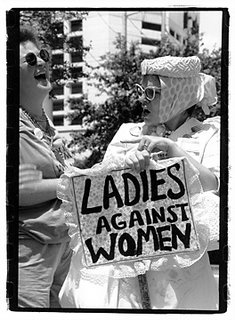
More to come! More photos more talk. All photos associated with this series are Mark's and under his full ownership.
Monday, November 06, 2006
A Conversation with a Houston Institute: Mark Lacy

What will follow over the next few days is an email interview we conducted throughout October.
*The Lacy image at bottom is of Adam Sherburne performing in the early 80's with his Houston band the Usuals. Adam went on to San Fran with Until December and later put together his most memorable project Consolidated. Mark and Adam were close during Adam's Houston phase.



